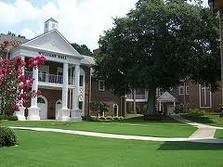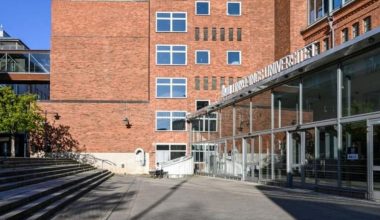Founded in 1477, Uppsala university is a public institution that is located primarily in Uppsala, Sweden which is some miles north of Stockholm.
The university also has a campus at Gotland. Students from European Union and European Economic Area countries and Switzerland do not pay tuition.
International students from outside these areas are charged tuition, which varies by academic discipline, with medical, science and technology-related studies costing more.
The university does not provide housing except to exchange students and tuition-paying master’s students. Outside housing organizations manage the residences for the school.
This article discusses Uppsala university and all the things about it that you need to know.
Table of contents
- Uppsala University in brief
- History of Uppsala University
- Carl Linnaeus and his role at Uppsala University
- Uppsala in the new world
- Where is Uppsala University?
- Programs and courses
- Why should I choose Uppsala University?
- Uppsala University rankings
- Uppsala University acceptance ratings
- University student/faculty ratio
- What are the application fees and tuition for Uppsala University?
- What do employers think of Uppsala University?
- Scholarships at Uppsala University
- Conclusion
- Recommendations
Uppsala University in brief
Uppsala University offers studies in the humanities and social sciences, medical and pharmaceutical, and science and technology disciplines. The school’s academic calendar is semester-based.
The university’s medical programs are affiliated with Uppsala University Hospital, where clinical training and research occur.
The primary language of instruction is Swedish for undergraduate programs, but a number of both Swedish- and English-taught master’s programs are available.
The university’s international master’s offerings are English-taught, including programs in computer science, entrepreneurship, and peace and conflict studies.
The university has many research centers, including the Uppsala Centre for Russian and Eurasian Studies, the Centre for Natural Disaster Science, and the Uppsala RNA Research Center.
History of Uppsala University
The University has grown from the 15th century down to the point where we are now. It has had a lot of growing to do.
As the first university in Scandinavia, it has had its challenges. Serious challenges and turmoil shaped the university as it was back then – a university with at most 50 students and some professors.
The university first fell apart in its earliest years due to political unrest. In the 1520s and 1530s Sweden’s new monarch, Gustav I Vasa carried out the Lutheran Reformation, which meant that the University, a daughter of the Church, lost its economic and ideological basis and for a long time remained only an idea without real content.
With the turn of the 17th century and the reign of Gustav II Adolf between 1611 and 1632, the university benefitted immensely from the leader’s need for progress.
During his reign, Sweden was consolidated as a leading military power in Northern Europe and an advanced bureaucratic State. The kingdom needed competent government officials.
Together with his main advisor, Chancellor Axel Oxenstierna, Gustav II Adolf provided benefits to the University, both economically and administratively.
In particular, he donated more than 300 farms to the University, which still owns and administers this property. Professors from other countries were summoned, and the number of students increased.
During this time, the system of student nations was imported from medieval universities on the continent.
It meant that students from the same region joined to help each other and have fun. This system is still in existence.
Carl Linnaeus and his role at Uppsala University
Carl Linnaeus was a botanist and professor at Uppsala University in 1741. He studied in the university and in Holland is one very popular person to have dominated the scene in the 18th century.
His love for botany made him send his students from the university to many other parts of the world to learn, and they did.
By the middle of the 18th century, the natural sciences at the University of Uppsala had blossomed.
This continued until Swedish king Gustav III, who reigned between 1771 and 1792 took an interest in the University and donated an extensive garden that belonged to the Royal Castle of Uppsala. Since then this garden has been known as the Botanical Garden.
Uppsala in the new world
From the 20th century down to this point is one that has allowed the university to continue to experience continuous educational reforms, expansions, and disruptions.
It has been difficult, but the university has managed to ride these storms. From having 50 students at inception, the university started to experience and manage student populations above 5000 in the 1960s.
By the 1990s, expansion occurred, with student populations exceeding 30,000 for undergraduate courses.
The 21st century has seen the university make some changes that have led to the democratization of modes of operating at the University. Students participate in decision-making bodies. Quality issues are in focus.
In recent years IT support has transformed ways of working, and a flexible teaching structure – flexible learning – applies not only to distance education but to an increasing extent to regular instruction.
Apace from increasing job-oriented education and further and continuing education, the university has become firmly established in vital areas.
READ ALSO: The University of Cambridge Scholarship Opportunities in 2024
Where is Uppsala University?
Uppsala University is located in Uppsala, Sweden, just north of Stockholm and previously used to have just one location. Still, vigorous growth has entailed new premises for education and research.
Whereas in the 1950s, the University’s activities were concentrated in University Hall and its environs, centrally located by the Cathedral, today the University is spread out over large areas, with several campuses of inter-and multi-disciplinary characters.
Programs and courses
Uppsala University offers more than 144 study programs at Bachelor’s and 120 at Master’s levels and 1,922 freestanding courses in various fields like theology, arts, law, social sciences, languages, pharmacy, medicine, mathematics, sciences and computer science.
Why should I choose Uppsala University?
Depending on whether you are going to study at the Master’s, Bachelor’s, or if you want to come to Uppsala University as an exchange student, different rules apply for admissions, housing, and the financing of your studies.
- Graduates of the university speak about how it is better than attending most other schools in Europe due to the quality of education they obtained from attending the school.
- The school attaches to practical work and applying what you have learned rather than vain performance Olympics.
- 35% of Master’s graduates gain a PhD
- The university is among the top 100 research groups rated top quality
- The university has two main study areas, which are in Uppsala and Visby
- Amazing student life
Uppsala University rankings
The University has, in recent years, with a few exceptions, ranked among the top 100 universities in the world by the three big international rankings lists, Times Higher Education (THE), QS World University Rankings, and ARWU (Shanghai Ranking).
Sweden’s Uppsala University’s latest placements in different university rankings:
- ARWU (Shanghai) – 77
- QS – 124
- Times Higher Education – 111
- Leiden ranking – 143 (Number of top 10% publications)
- US News – 102
- Webometrics – 99
The Leiden Ranking is a bibliometric ranking list that shows a university’s scientific impact through several indicators.
It also measures international collaborations, industry collaborations, etc. Webometrics is a ranking list that measures visibility on the web.
Uppsala University acceptance ratings
In a country like Sweden that is known to be welcoming and has more than 89% of the population understanding English, the acceptance ratings of Uppsala university as one of the foremost universities in the country is no surprise.
Uppsala university has an acceptance rate of 80% and plans to increase that if its expansion plans work out well.
University student/faculty ratio
The university has a total number of about 26,521 students with 70% of them being undergraduate students and 30% of those as postgraduate students.
Of the total number, 4,246 of those are international students, with 39% of those as undergraduate students and 61% of those as postgraduate students.
The university also has a total faculty staff number of 2,659, with 1998 being domestic staff and 661 being international staff.
What are the application fees and tuition for Uppsala University?
The application fee for students from outside the European Union, European Economic Area and Switzerland is SEK 900.
This is paid directly to universityadmissions.se when you submit your application for Bachelor’s or Master’s studies.
The cost of tuition varies between Bachelor’s and Master’s programs. Depending on the program, one semester of full-time study costs between SEK 50,000 and 72,500 per semester. Ph.D. programs are free of charge in Sweden, regardless of citizenship.
However, if you are enrolled as a Ph.D. student and wish to take additional courses at Bachelor’s or Master’s level that are not included as part of your research program, you must pay application and tuition fees if you are a citizen of a country outside the European Union, European Economic Area or Switzerland.
What do employers think of Uppsala University?
QS ranks Uppsala university’s employability ranking between 201 and 250. They graded the university’s employer reputation at 34.1, alumni outcomes at 46.9, and partnerships with employers at 49.9.
Alumni of the university have fared well in the job market and continue to do well as both employees of large corporations with an academic reputation of 77.5 and employers of labor with employer reputation at 50.3.
Scholarships at Uppsala University
To be considered for a scholarship, you must first apply for a Bachelor’s or Master’s program at Uppsala University on universityadmissions.se.
The program at Uppsala University must be ranked as your first priority of choice. The scholarship application period starts after this step.
There are a number of scholarships available each year for fee-paying international students who are applying to an international Bachelor’s or Master’s program at Uppsala University.
Some scholarships are specifically designated for students applying to one of Uppsala University’s Master’s programs, while others are open to both Master’s and Bachelor’s applicants.
Some scholarships are open for all citizens of a country outside of the European Union (EU)/European Economic Area (EEA) or Switzerland. In contrast, others are only open to citizens of certain countries.
You may apply to multiple scholarship program, as long as you fulfill the eligibility criteria. However, it is only possible to receive one scholarship from Uppsala University.
Conclusion
Irrespective of whether you choose to go along with Uppsala university or not or the course or program you choose to go along with, the goal is to open up to you the value in choosing the university as your first choice institution.
The value of reduced fees, rich history, and high-value instructors is relatively underrated compared to those with buzz names.





